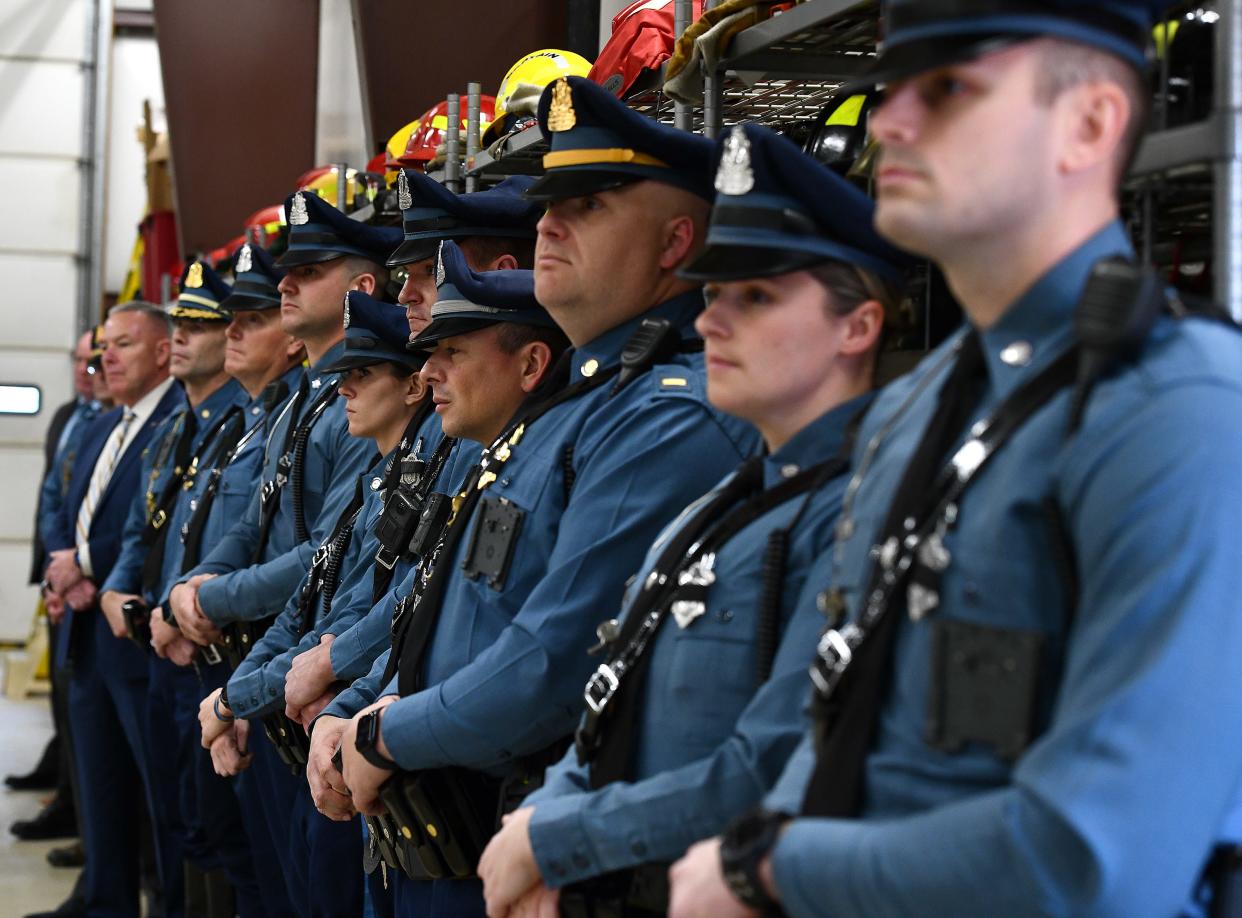Reinstating education incentive for troopers could increase recruitment, wage equity

BOSTON - Reinstating an educational incentive in the salary and benefits package offered to new state trooper recruits could do more than just raise their pay and allow for career advancement over time.
The measure, according to Rep. Michael Kushmerek, D-Fitchburg, one of the co-sponsors of the bill with Rep. Sean Garballey, D-Arlington, and Sen. Michael Rush, D-Boston, could attract more applicants to take the state trooper exam, help retain career officers who attain degrees in higher education and bring parity to trooper salaries.
Massachusetts state troopers hired before 2009, Kushmerek told the Joint Committee on Public Safety and National Security at its most recent meeting, earn higher salaries than recently hired officers due to an educational incentive that was eliminated in 2008 with the need for budgetary restrictions forced on the state by the Great Recession.
The two-tiered salary system benefits veteran troopers over new recruits, Kushmerek said, pointing out that more recent hires tend to include more women and people of color.

“The overwhelming majority of new hires in underrepresented classes and women have been hired in the past 15 years,” Kushmerek said. “They are not offered an education incentive and their earnings are potentially lower than their veteran, white colleagues hired before 2008. We need this to arrive at parity, equity and fairness in the salary structure.”
Leaders of the State Police Association of Massachusetts, the union representing officers, attended the Monday committee hearing in support of the proposed measure.
Luke Bonin, the vice president of the union, said that research indicates that highly educated law enforcement officers are less likely to use deadly or excessive levels of force in situations. Officers who obtain higher education degrees are more like to seek ways to de-escalate and resolve situations without resorting to the use of excessive force.
“Reinstating the educational incentive would attract a larger pool of qualified candidates,” Bonin said.

Applicants seeking to become troopers in Massachusetts, according to the Massachusetts government website, must be at least 21 and no older than 34 on the last day they can apply to take a scheduled entrance exam. They must be high school graduates or have earned a GED certificate upon appointment to the police academy.
Other requirements include:
No felony or misdemeanor convictions or drug law violations, no time spent incarcerated
Passing a physical and medical examination, which includes a psychological component
Demonstrate good moral character, sound work ethic and decision-making skills
Qualify and be suitable to hold for a firearms license
Meet physical fitness standards
Be a U.S. citizen and Massachusetts resident upon appointment to the academy
Have a valid Massachusetts driver’s license
Run 1.5 miles within different time ranges depending on applicant’s age and gender.
Union President Patrick McNamara told legislators that in the past as many as 20,000 people applied to take the state trooper exam. The last test attracted 3,400 applicants.
More recent recruits, McNamara said, could earn up to 25% less than the veteran officers hired before 2008.
“Their lives have been devalued,” McNamara said.
The union's leaders contend that many potential trooper candidates opt to work for municipal departments that offer educational incentives as part of the salary and benefits package.
“Restoring the education incentive is up to the state Legislature,” McNamara said.
In a poll commissioned by the organization, 65% of state residents asked said they support state troopers and see both troopers and municipal officers in favorable lights. At least 75% would maintain a high level of investment in troopers, while 15% would decrease the state’s level of investment and fully 3% would opt to defund the police.
No legislative opposition to date
Kushmerek said the bill has not logged any opposition in the Legislature to date.
However, he pointed out that the police reform measures enacted over the last few years by the state were designed to create a professional standard for all law enforcement officers working in Massachusetts.
The Massachusetts Peace Officer Standards and Training Commission, established in 2020, aims to improve policing and to enhance public confidence in law enforcement, according to the state website. The commission implements officer training and certifications, and addresses disciplinary issues in a clear and transparent manner. Hearing results for individuals and departments are posted on the state website and can be searched by last names and by a law enforcement agency and are available on spreadsheets.
“The education incentive would fit hand-in-hand with the POST Commission (mission),” Kushmerek said, adding the bill would help Massachusetts recruit more representatives of the community they serve — skilled, rounded and educated officers, “the best, brightest, most capable.”
While the bill would not offer a “look back” to rectify the lack of incentives, it would immediately increase the salaries of those officers who pursued degrees on their own, Kushmerek said.
Annual cost to state could range $14M-$16M
The bill could cost the state between $14 million and $16 million a year, he speculated.
But once the Boston police contract is ratified by membership and signed by city and union officials, the annual department budget stands to increase by 21% over five years, including an increase in base salaries to $90,000 a year, up from $82,278, according to published reports pertaining to the contract.
The starting salary for Massachusetts troopers is $69,542. Other benefits include health and life insurance, equipment and uniforms, and tuition remission for certain colleges and universities, according to the state website.
The union has scheduled a meeting next year with Gov. Maura Healey to urge her to reinstate the education incentive. In the meantime, it is supporting an alternative fix through the proposed legislation.
This article originally appeared on Telegram & Gazette: Police hopefuls opting for municipal departments, not with Troopers

